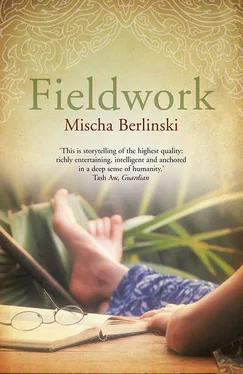Of all the prejudices of her own culture, the one Martiya found most difficult to shed was a desire for solitude. Just like poor, cold Eskimo Kathy, Martiya wanted a room of her own. She wanted a place where several hours a day she didn't have to wear an anthropologist's encouraging semi-grin. She wanted a place where she could type up her field notes on the portable typewriter she had lugged up into the mountains and look them over slowly and spread them out, a quiet place to transcribe the hours of dictation she took on her tape recorder. She wanted a place where she could interview her informants one by one, in privacy. She had learned the hard way that it was the height of bad manners for a woman's pelvis ever to be above the level of a man's head in a Dyalo village — this in a culture in which everyone sat on the floor — and she wanted a place where for a few hours a day she didn't have to waddle around like a goose. She wanted a place that she could clean up: when she tried to clean up the thatch hut where she lived with a village family, she was told that she was making the spirits angry. She wanted an office. She thought of her father's office in Dwinelle Hall, where she had sometimes studied after school as a teenager: the two huge desks, the bay view, the sparkling light, the chair with excellent lumbar support (before spending six months on the floor, she hadn't even known she had a lumbar), the lights which flicked on at the touch of a button, the way the door clicked closed, offering a clear and inviolable indicator to all the world of the occupant's desire to be left alone . Martiya, after about three months in a Dyalo village, began to fantasize about a quiet, clean office where she could sit on a real chair at a real desk all by herself.
And most of all, she wanted to get away from Farts-a-Lot.
It wasn't that the Dyalo weren't nice. They were very nice. They smiled a lot and at first everyone in the village had been vaguely curious about why she was there, and even offered her good things to eat — fried peanuts wrapped in a banana leaf, or a bunch of fresh bananas, or some watermelon, or a slice of bloody pork from a recently butchered pig. Martiya was quite sure that had a Dyalo anthropologist showed up at her little apartment in Berkeley, camped out on her couch, and asked her a lot of dopey questions on the order of "Why do you close the bathroom door when you defecate?" she wouldn't have been half as nice about it.
When Martiya was in college, Tim Blair had taken her to a butterfly house. It was like a large greenhouse, with two sets of double-swinging doors to ensure that the butterflies never escaped. Now, Martiya had always liked butterflies just fine, pretty little things with brightly colored wings fluttering gently across a flowery meadow; but she had never really been around more than one or two butterflies at a shot, and as soon as she entered the butterfly house, she realized that when considered in large quantities, butterflies were insects . Big flapping bugs, with huge antennae, and buggy snouts, who wanted to land in her hair and crawl all over. That was pretty much when she knew it wasn't going to work with Tim, when he wanted to stop and play with each and every butterfly, and read the informative placards, and say, "Hey, Martiya! Check this guy out! He's got stripes!"; and all Martiya wanted to do was flee. Living with the Dyalo, Martiya was beginning to fear, was just a little like visiting the butterfly house: a few days in a village, an afternoon discussing an interesting rite, a field-clearing ceremony or two — that was fine. But what she hadn't thought about back in Berkeley was that there would be Dyalo around all the time , doing tribal things all the time , talking in their weird language all the time .
And she could hardly blame them, really: they were here first. This was, after all, their home. She had come to them.
Vinai had found the hut for Martiya. When she had first arrived in Dan Loi, he introduced her to the village headman and although the first meeting was not entirely satisfactory— I mean , she wrote to Karen, I have come a hell of a long way, and I didn't exactly notice a long line of other interested anthropologists declaring that they wanted to learn the ways of the wily Dyalo, not that I expected to be a blood sister straight off, but still, I was looking for more than a grunt … — Martiya was installed, just as she had requested, in a real Dyalo thatch hut with a real Dyalo family. The hut had uneven wood floors which left big splinters in Martiya's feet, walls of plaited bamboo which did almost nothing to block the unexpectedly chilly night winds, and a thatch roof that leaked, just as she had been warned it would. Drip, drip, drip . Martiya's hosts bluntly cautioned her that if she had sex in the hut, it would anger the spirits; and when she asked why the Dyalo did not build chimneys to allow their dwellings to evacuate the smoke from the cooking fire, smoke which caused her eyes to burn and covered her skin in a constant ghostly film of light gray soot, she was told, "It is not our custom."
It would anger the spirits , or it is our custom , or it is not our custom : these, in fact, were the responses Martiya received, sooner or later, to almost every question she posed about Dyalo society those first few months in Dan Loi:
Martiya: "Why is a woman not permitted to kill a rat?"
Dyalo woman: "Because it would be shameful."
"Why would it be shameful?"
" Because it would anger the spirits. "
Martiya: "Why can't children drink cooked chicken's blood?"
Dyalo Woman Number One: " Because it is our custom. "
Dyalo Woman Number Two: "Children can't drink cooked chicken's blood?"
Dyalo Woman Number Three: " It would anger the spirits. "
Martiya: "Why does the second male son inherit property?"
Sagacious Dyalo elder: "I do not have a second male son."
"If you had a second male son, would he inherit property?"
"But I don't have a second male son."
Martiya, slyly: "Sings-Too-Loud has a second male son, doesn't he?"
"Yes."
"Will his second male son inherit property?"
"Oh, yes!"
"Why?"
Triumphantly: " It is our custom. "
Martiya: "Why is it shameful for a man and his wife to sing the mourning song together?"
" It would anger the spirits. "
Martiya: "Why is the spirit altar in every home situated on the upslope of the hill?"
" Oh, that is our custom. "
"What would happen if the altar wasn't on the upslope of the hill?"
" It would anger the spirits. "
Martiya: "Why is there a rotting dead bullock lying in the front yard of that house?"
"Whose house?"
"The house of Old-Snoring-Lady."
"You must ask Old-Snoring-Lady. I am too shy to tell you."
"Why are you too shy?"
"It is our custom."
The hut smelled like a gerbil cage, and sounded like one too: Dyalo nights were long and filled with strange scratching sounds, whispers, moans, baying dogs, croaking insects, and the tiny, terrifying footsteps of rats running along the rafters. By nine at night, the entire hut was sleeping except Martiya, who lay on her thin straw mat — she slept directly on the floor, Dyalo style — and wondered why she had never once in her life suffered insomnia before coming to a Dyalo village. The hut was lit at night only by an oil lamp, which meant that Martiya could not read before bed, and Martiya had always read before going to bed.* When the lamp was blown out, there was nothing to do but lie on the rough-hewn floor, slap idly at the mosquitoes that had succeeded in breaching the defensive perimeter of her mosquito net, and wonder just where the hell she had found herself.
Читать дальше












